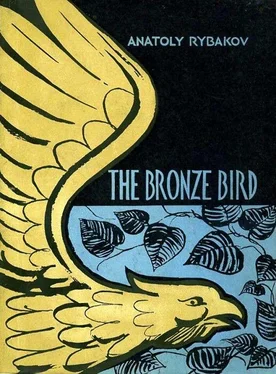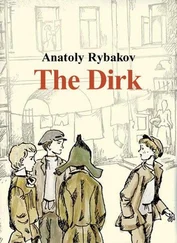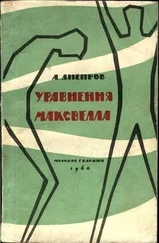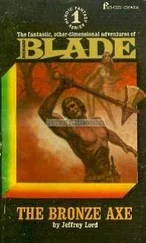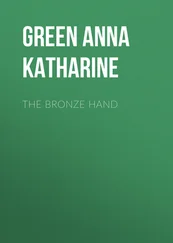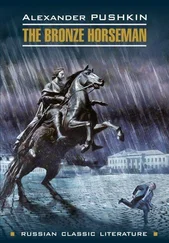Anatoly Rybakov - THE BRONZE BIRD
Здесь есть возможность читать онлайн «Anatoly Rybakov - THE BRONZE BIRD» весь текст электронной книги совершенно бесплатно (целиком полную версию без сокращений). В некоторых случаях можно слушать аудио, скачать через торрент в формате fb2 и присутствует краткое содержание. Город: Moscow, Год выпуска: 1956, Издательство: Foreign Languages Publishing House, Жанр: Детские приключения, Детектив, Исторические приключения, на английском языке. Описание произведения, (предисловие) а так же отзывы посетителей доступны на портале библиотеки ЛибКат.
- Название:THE BRONZE BIRD
- Автор:
- Издательство:Foreign Languages Publishing House
- Жанр:
- Год:1956
- Город:Moscow
- ISBN:нет данных
- Рейтинг книги:5 / 5. Голосов: 1
-
Избранное:Добавить в избранное
- Отзывы:
-
Ваша оценка:
- 100
- 1
- 2
- 3
- 4
- 5
THE BRONZE BIRD: краткое содержание, описание и аннотация
Предлагаем к чтению аннотацию, описание, краткое содержание или предисловие (зависит от того, что написал сам автор книги «THE BRONZE BIRD»). Если вы не нашли необходимую информацию о книге — напишите в комментариях, мы постараемся отыскать её.
THE BRONZE BIRD — читать онлайн бесплатно полную книгу (весь текст) целиком
Ниже представлен текст книги, разбитый по страницам. Система сохранения места последней прочитанной страницы, позволяет с удобством читать онлайн бесплатно книгу «THE BRONZE BIRD», без необходимости каждый раз заново искать на чём Вы остановились. Поставьте закладку, и сможете в любой момент перейти на страницу, на которой закончили чтение.
Интервал:
Закладка:
That was how Korovin really came to be here, but Misha did not tell his friends the whole story so that they would not think he was boasting. All he told them was that there would be a labour commune here.
"Boy!" Genka whistled. "I can just see the countess letting them in!"
"Who's that?" Korovin asked with a questioning look at Misha.
"The estate," Genka explained, sawing the air with his hands› "belonged to a landlord, a certain Count Karagayev. He beat it after the Revolution, taking everything with him, except the house, of course. There's only an old woman, a relative of the count's or a hanger-on, living in the place. We call her the countess. She's looking after the manor and won't let anybody in. And that goes for you, too."
Korovin again inhaled through his nose, but with a shade of injury this time:
"How d'you mean she won't let us in? The estate belongs to the government."
"Exactly," Misha hastily interposed. "The countess has a safeguard for the house only because it's a historical monument. Either Tsaritsa Elizabeth or Catherine II once stayed in it. And the countess thrusts that safeguard into everybody's noses. But judge for yourself, if all the houses the tsars and tsaritsas stayed in are to remain empty, then where are the people going to live?" And considering the question settled, he said, "Come on, chaps! Korovin and I've been hauling these sacks all the way from the station. You carry them now."
Genka quickly lifted one of them. But Slava made no move.
"You see, Misha," he said, "yesterday Igor and Seva..."
"Oh yes," Genka said, interrupting him and lowering the sack to the ground, "I was going to tell you, but Slava shot his mouth. You're always doing that, Slava. Well, you see, Misha," he faltered, "the thing is... How to put it..."
"Stop beating about the bush," Misha said angrily. " 'You see,' 'you understand'!"
"Hold your horses. It's like this. Igor and Seva have run away."
"What! Where to?"
"To fight the fascists."
"What's all this nonsense!"
"Here, read this yourself."
Genka gave Misha a note. It was very short: "Good-bye, chaps, we've gone to fight the fascists. Igor. Seva."
Misha read it a few times.
"What utter nonsense!" he said, shrugging his shoulders. "When did this happen?"
"Yesterday, I mean today," Genka began to explain. "Yesterday they went to bed the same time as everybody else, but when we woke up this morning, they were gone. We found this note. Last night I thought they were acting suspiciously when they suddenly began to polish their boots as though it were a holiday. It made me want to laugh."
But Misha did not think it was a joke.
"Have you looked for them?"
"Everywhere. In the woods and in the village."
"Fine deputies you are," Misha said with a deprecatory gesture of his hand, giving Genka and Slava a withering look.
"What have we got to do with it?" Genka and Slava cried in unison.
"Plenty! Nobody ran away before!"
Genka pressed his hand to his breast.
"I give you my word of honour."
"You can keep your word of honour," Misha stopped him. "Let's go to the camp!"
Genka and Slava shouldered the sacks and followed Misha.
Chapter 3
THE MANOR
The path twisted and turned across fields.
Genka chattered without stop, but when he spoke he had to wave his hands and so somehow, without anyone noticing it, the sack returned to Korovin's shoulders.
"Even if you outwit the countess," Genka rambled on, "it won't be easy to organize a labour commune here and get things going. In fact, I'll say it's impossible. There's nothing in the estate, only the house. Not a thing else. No harrow, plough or cart. And don't think for a moment that the peasants got them. They were all pinched by the kulaks. I can swear to that! The kulaks they've got here have got all the others beat. You can't imagine what they're doing."
"What?" Korovin asked.
"You are a numskull! We came here to organize a Young Pioneer troop, but look at the odds against us. First, the kulaks. Second, religion. Third, lack of understanding by the parents: they're not letting the kids join. When we put on a show, we get a full house, but the minute we announce a meeting, they all scatter."
"I know all about that," Korovin observed meaningfully.
"Exactly," Genka went on. "And the village kids themselves... They're steeped in superstition! Wood-goblins and devils are all they talk about. Try and organize them!"
"So you're finding it difficult, what?"
"That's not the half of it," Genka said in a mournful voice, but the next moment he added boastfully, "but we've done harder things. And we'll get this job done too. Here, we've brought them books," he tapped the sack Korovin was carrying for him, "we're giving shows and we're helping to stamp out illiteracy. You'll see, we'll organize the first Young Pioneer troop. Isn't that right, Misha?"
Misha made no reply. He was thinking how unhappily his duties as troop leader were starting. Two Young Pioneers had disappeared on the very first day. Where could they have gone? They could not go far without money or food. They might get lost in the woods, drown in the river, or get run over by a train.
Should he inform their parents? No, not for the time being anyway. Why worry them for nothing? The boys would be found sooner or later. Besides, their parents would raise the alarm throughout the whole of Moscow. And in the village, people were now probably saying that the Young Pioneers were running away, that children should not be allowed to join the troop. That was what Igor and Seva had done. They had undermined the troop's prestige, setting all its labours of the past month at naught!
These gloomy thoughts were interrupted by Genka, who cried out:
"There's the manor!"
The boys stopped.
A two-storeyed house surrounded by trees stood before them high on a hill. It seemed to have several roofs and many chimneys. A big, semicircular verandah with banisters resting on small, white, brick posts divided the house into two equal halves. Over the verandah there was a loft with windows on either side and a recess in the middle. A broad avenue led across the garden to the house. The first, smooth earthen stretch gave way to sloping stone steps that gradually formed a staircase running round the verandah on both sides.
"Like it?" Genka asked, clicking his tongue.
"The important thing is what it's got," Korovin said, inhaling noisily.
"Nothing," Genka assured him.
Indeed, the estate looked neglected. The orchard was overgrowing with weeds, and the pond was covered with filthy-green slime. Every thing looked dead, lifeless, cheerless.
It was only when the boys had penetrated deep into the orchard that the oppressive silence around them was broken by resounding young voices.
There were white tents beyond a broken fence. That was the camp. The troop came running to meet Misha. Zina Kruglova was in front. She ran the fastest on her stubby legs.
Chapter 4
THE TROOP
Properly speaking, this was not the whole troop but only a group of 15 of its eldest members. Nine were Komsomols. The others were due to be accepted as Komsomols in the autumn. But they called themselves a troop, and why not?
Three tents stood beneath trees along the edge of a glade, in the middle of which was a tall flag-staff with a pennant fluttering on it. A fire was burning nearby. Over it was a charred stick supported by two tripods. The children on kitchen duty were busy cooking dinner. There was a strong smell of burnt milk.
"Everything is in order," Zina said, speaking very quickly. "We've sent off the letter to the sailors of the Red Fleet and held an illiteracy-abolition class yesterday. Eight people turned up instead of twelve. I suppose they," Zina nodded in the direction of Genka and Slava, "have already told you about Igor and Seva."
Читать дальшеИнтервал:
Закладка:
Похожие книги на «THE BRONZE BIRD»
Представляем Вашему вниманию похожие книги на «THE BRONZE BIRD» списком для выбора. Мы отобрали схожую по названию и смыслу литературу в надежде предоставить читателям больше вариантов отыскать новые, интересные, ещё непрочитанные произведения.
Обсуждение, отзывы о книге «THE BRONZE BIRD» и просто собственные мнения читателей. Оставьте ваши комментарии, напишите, что Вы думаете о произведении, его смысле или главных героях. Укажите что конкретно понравилось, а что нет, и почему Вы так считаете.
